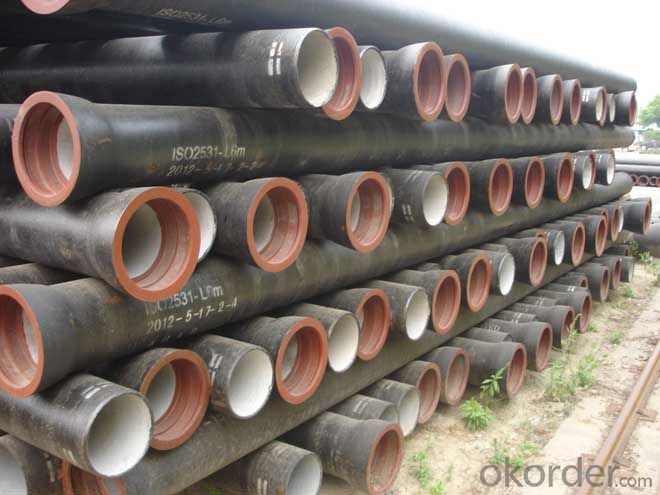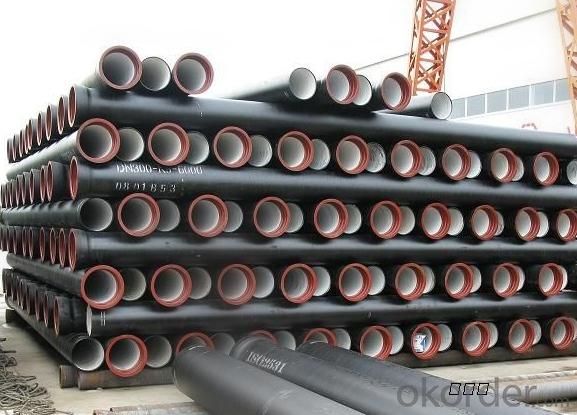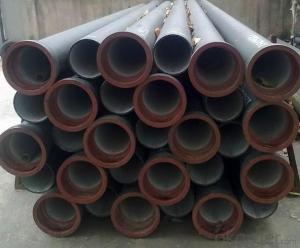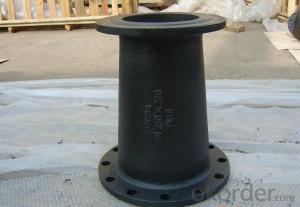Ductile Iron Pipe of China DN300 ISO2531 On Sanitary
- Loading Port:
- China main port
- Payment Terms:
- TT or LC
- Min Order Qty:
- 20 m.t.
- Supply Capability:
- 100000 m.t./month
OKorder Service Pledge
OKorder Financial Service
You Might Also Like
1,Ductile Iron Pipe Description :
DI pipe fittings are manufactured according to ISO 2531 or BS EN545 or BS4772 FOR POTABLE WATER ,internal is cement lining or wet epoxy coating;External is zinc plus bitumen or wet epoxy coating. We also manufacture ductile iron fittings with fusion bonded epoxy both inside and outside. All the producets are sutible to water pipes fields.
Pipes confirm to ISO2531,K9 class,T type joint,6m long,with inside cements lining conform to ISO4179, outside Zinc spraying(130g/m2) and bitumen coating(70μm) conform to ISO8179.
Pipe ends: Spigot and socket ends, with 100% SBR rubber gaskets accoding to ISO4633
2,Main Features of the Ductile Iron Pipe:
·High yield strength
·High tensile Strength
·High corrosion resistance
·Pressure Resistence
·Anti-corrosion
·Installation is convenient
·Satisfy the highest hygienic standards
3,Ductile Iron Pipe Images:


4. Ductile Iron Pipe Specification
Standard: API SPEC 5L 44th eidtion,ASTM A252-98(2007)
Grade: A53 Grades A/B, ASTM A106 Grades B/C,ASTM A179
AWWA, C200, ASTM A139, ASTM A120, API 5L Grade B
X42, X52, X56, X60, X65, X70, X80, X100
Weld Alternatives: LSAW
OD size range: 6.4~44.5mm
Wall thickness: 406.4~1422mm
Length: 3 - 12 m according to requirment
Note: Other grade can also be provided after consulting. Special design are available
for coal slurry conveyance LSAW line tube -- Service.
Place of Origin: China (Mainland)
Model Number: DN80-1600 Length: 6M/5.7M/NEGOTIATED Standard: ISO2531 / EN545
Application: Potable/Sewage Water
Diameter: DN80-1600
Shape: Round
Hardness: 230 Pipe
Wall Thickness: standerd
Pull Strength: 420
Yield (≥ MPa): 300
Material: Ductile Iron water ductile iron pipe: SO2531 / EN545 DI pipe
Packaging & Delivery
Delivery Detail: 30-45 days
Specifications
ductile iron pipe:
1. DN80-DN1600mm (T-Type, Class K9)
2.effective length 6m/pc
3.comply with ISO2531/EN545/EN598
5.FAQ:
We have organized several common questions for our clients,may help you sincerely:
1.Q: Why would you choose ductile iron pipe rather than other pipe materials?
A:The reasons are obvious for that not only ductile iron pipe possesses the inherent strength and flexibility of ductile iron, combined with proven corrosion protection systems, but also the cost savings can be achieved from design to installation and commissioning.
2.Q:Why can you guarantee the inner of pipes can’t be corroded?
A: High alumina cement mortar lining and sulphate-resistant cement mortar lining. These two special linings are applicable to inner anti-corrosion for sewage pipes, improving resistance to erosion of the sewage components.
- Q:How does ductile iron pipe perform in areas with high soil erosion?
- Ductile iron pipe is renowned for its remarkable strength and durability, rendering it a dependable option for regions experiencing extensive soil erosion. With its distinctive composition, including graphite nodules, it possesses the capacity to be both pliable and resistant to fractures or cracks, even in demanding environments. Consequently, ductile iron pipe is highly capable of enduring the impact of soil erosion. In regions with high soil erosion, the surface of the pipe can potentially be scraped by soil particles, leading to abrasions or damage. However, ductile iron pipe's substantial wall thickness and corrosion-resistant coating effectively serve as a barrier against these abrasive forces. Consequently, even in regions with considerable soil erosion, ductile iron pipe can maintain its structural integrity and functionality. Additionally, the ability of ductile iron pipe to resist corrosion further augments its performance in areas with high soil erosion. Soil erosion frequently results in increased moisture content, which can expedite the corrosion process for certain materials. Nonetheless, ductile iron pipe's protective coating, typically composed of zinc or epoxy, acts as a shield against corrosion, ensuring prolonged performance and reliability. To summarize, ductile iron pipe exhibits exceptional performance in regions with high soil erosion due to its strength, flexibility, and resistance to fractures or cracks. Its substantial wall thickness and corrosion-resistant coating make it highly durable against abrasive forces and corrosion, enabling it to withstand the challenges posed by soil erosion. Consequently, ductile iron pipe is a dependable choice for infrastructure projects in these areas, offering long-lasting and efficient water and wastewater transportation systems.
- Q:Can ductile iron pipe be used for underground applications?
- Yes, ductile iron pipe can be used for underground applications.
- Q:How are ductile iron pipes different from other types of pipes?
- Ductile iron pipes, also known as DI pipes, are distinct from other types of pipes due to their unique properties and manufacturing process. Unlike other pipes such as PVC, steel, or concrete, ductile iron pipes are specifically designed to withstand high-pressure systems and offer exceptional strength and durability. One key difference lies in the material used. Ductile iron pipes are made from a type of cast iron that contains additional elements such as carbon and silicon, which give them their remarkable strength and flexibility. This composition allows DI pipes to handle high-pressure systems, making them suitable for applications that require reliable water supply, such as water mains, sewer systems, and industrial pipelines. Another distinguishing feature of ductile iron pipes is their ability to withstand external loads and pressure. DI pipes have a high tensile strength, which means they can bear heavy loads without cracking or breaking. This property makes them ideal for underground installations where they can endure the weight of soil, traffic, and other external factors. Furthermore, ductile iron pipes have excellent corrosion resistance. They are coated with a protective layer, usually through a process called cement lining, that guards against rust and corrosion caused by the elements, chemical reactions, or the transported fluids. This corrosion resistance significantly extends the lifespan of the pipes, reducing maintenance and replacement costs over time. Additionally, ductile iron pipes offer great flexibility. They are known for their ductility, meaning they can deform without fracturing under stress, making them less prone to cracks and leaks. This inherent flexibility allows them to withstand ground movement and seismic activities, ensuring a safe and reliable water distribution system. In terms of installation, ductile iron pipes are relatively easy to handle due to their lighter weight compared to other materials like concrete or steel. They are also available in various lengths and diameters, making them adaptable to different project requirements. Overall, ductile iron pipes stand out from other types of pipes due to their exceptional strength, resilience, corrosion resistance, and ease of installation. These properties make them a preferred choice for numerous infrastructure projects, where reliability and longevity are crucial factors.
- Q:What are the typical pressure surge protection measures for ductile iron pipe?
- There are several typical pressure surge protection measures for ductile iron pipe that help ensure its integrity and longevity. These measures include: 1. Surge tanks: Surge tanks are commonly used to absorb pressure surges and minimize their impact on the ductile iron pipe. These tanks are typically installed at critical points in the pipeline system, such as at pump stations or near valves, to provide a reservoir for excess pressure. 2. Air release valves: Air release valves are essential components in ductile iron pipe systems that help release trapped air and prevent the formation of air pockets. These valves help maintain a stable pressure within the pipe and reduce the risk of pressure surges during operation or sudden changes in flow. 3. Pressure relief valves: Pressure relief valves are designed to protect ductile iron pipes by releasing excess pressure when it exceeds a predetermined threshold. These valves are typically installed at strategic locations in the pipeline system and are set to open when the pressure exceeds a safe limit, diverting the excess pressure to prevent damage to the pipe. 4. Surge suppressors: Surge suppressors are devices that are installed in ductile iron pipe systems to absorb and dissipate pressure surges. These devices act as shock absorbers, reducing the impact of pressure fluctuations and preventing damage to the pipe. Surge suppressors are particularly effective in situations where pressure surges are frequent or severe. 5. Pipe wall thickness: Another crucial measure for pressure surge protection in ductile iron pipe is ensuring an appropriate pipe wall thickness. By selecting a pipe with the correct wall thickness, engineers can ensure that the pipe can withstand the pressure surges it may encounter during operation. This helps prevent pipe failure or rupture due to excessive pressure. It is important to note that the specific pressure surge protection measures implemented for ductile iron pipe may vary depending on the specific application, pipe size, operating conditions, and regulatory requirements. Consulting with experts in pipeline engineering and design is crucial to determine the most suitable pressure surge protection measures for a particular ductile iron pipe system.
- Q:Can ductile iron pipe be used for high-pressure gas systems?
- Ductile iron pipe is a viable option for high-pressure gas systems due to its remarkable strength and durability. Its ability to withstand high pressures makes it suitable for applications requiring such systems. It possesses outstanding mechanical properties, including high tensile strength, yield strength, and impact resistance. These properties enable it to endure the pressures associated with gas transmission. Additionally, its resistance to corrosion ensures its reliability for long-term use in high-pressure gas systems. However, to ensure optimal safety and performance, it is crucial to consider the specific requirements and regulations of the gas system and seek guidance from industry professionals for correct installation and maintenance of the ductile iron pipe.
- Q:How do ductile iron pipes handle ground settlement due to construction activities?
- Ductile iron pipes have the ability to handle ground settlement caused by construction activities due to their flexibility and strength. These pipes are designed to withstand external pressure and can accommodate minor ground movements without significant damage or failure. The ductility of the material allows the pipes to deform slightly, absorbing the ground settlement and preventing them from cracking or breaking. Additionally, the joints in ductile iron pipes are typically flexible, allowing for further movement and reducing the risk of leakage or structural issues. Overall, ductile iron pipes are well-suited for withstanding ground settlement and ensuring the integrity of the pipeline system during construction activities.
- Q:What is the average cost of ductile iron pipes?
- The average cost of ductile iron pipes can vary depending on factors such as the size, length, and supplier. However, on average, ductile iron pipes can range from $30 to $300 per linear foot.
- Q:Ductile iron pipes lined with cement mortar in the water (living water, water in the 6.9-7.3) in the early pH, why pH increased? How to solve this problem?
- 1, because of the bone in mortar, such as silicate products, there will be silicification reaction, in addition, there is the reaction of limestone in lime.2, cement mortar lining cover coating, that is, spray some paint! Some questions four are unavoidable
- Q:How do ductile iron pipes perform in acidic soil conditions?
- Ductile iron pipes have a reputation for being durable and resistant to different environmental conditions, including acidic soil conditions. When exposed to acidic soil, these pipes exhibit excellent resistance to corrosion due to their unique composition and protective coating. The high carbon content in ductile iron pipes gives them inherent resistance to corrosion, even in acidic environments. Additionally, these pipes are typically lined with cement mortar or a suitable epoxy coating, which provides an extra layer of protection against acid attack. The combination of the high carbon content and protective coating creates a barrier that prevents direct contact between the acid and the iron, thus minimizing the risk of corrosion. This ensures that the pipes remain structurally sound and maintain their integrity over a long period of time. Furthermore, ductile iron pipes have a long service life and are designed to withstand a wide range of soil conditions. Their strength and flexibility enable them to endure the stresses and strains caused by the surrounding soil, including acidic soil environments. This makes them an ideal choice for applications in soils with higher acidity levels. It is important to note that while ductile iron pipes perform well in acidic soil conditions, the severity and concentration of the acid can affect their performance. In extremely aggressive or highly concentrated acidic environments, additional corrosion protection measures may be necessary, such as sacrificial anodes or cathodic protection systems. In conclusion, ductile iron pipes are highly resilient and excel in acidic soil conditions. Their corrosion resistance, combined with their strong structure and protective coating, ensures their longevity and reliability, making them a preferred choice for various applications in such environments.
- Q:Can ductile iron pipes be used for mining applications?
- Yes, ductile iron pipes can be used for mining applications. Ductile iron pipes possess excellent mechanical properties, such as high tensile strength, impact resistance, and durability, making them suitable for various demanding environments, including mining operations. These pipes can withstand heavy loads and pressures, making them ideal for transporting water, slurry, and other fluids used in mining processes. Additionally, ductile iron pipes have a smooth internal surface, minimizing friction and facilitating efficient flow of materials. Hence, they are widely used in applications such as dewatering, tailings disposal, and transporting corrosive or abrasive materials in the mining industry. Overall, ductile iron pipes are a reliable and cost-effective choice for mining applications due to their strength, durability, and suitability for demanding conditions.
1. Manufacturer Overview |
|
|---|---|
| Location | |
| Year Established | |
| Annual Output Value | |
| Main Markets | |
| Company Certifications | |
2. Manufacturer Certificates |
|
|---|---|
| a) Certification Name | |
| Range | |
| Reference | |
| Validity Period | |
3. Manufacturer Capability |
|
|---|---|
| a)Trade Capacity | |
| Nearest Port | |
| Export Percentage | |
| No.of Employees in Trade Department | |
| Language Spoken: | |
| b)Factory Information | |
| Factory Size: | |
| No. of Production Lines | |
| Contract Manufacturing | |
| Product Price Range | |
Send your message to us
Ductile Iron Pipe of China DN300 ISO2531 On Sanitary
- Loading Port:
- China main port
- Payment Terms:
- TT or LC
- Min Order Qty:
- 20 m.t.
- Supply Capability:
- 100000 m.t./month
OKorder Service Pledge
OKorder Financial Service
Similar products
New products
Hot products
Hot Searches
Related keywords
























